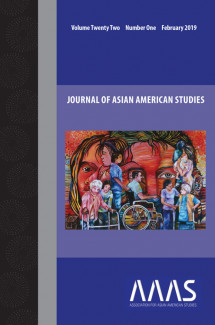
Johns Hopkins UniversityEst. 1876
America’s First Research University
Real Conversations to Solve Problems

Earlier this year, the Journal of Asian American Studies released a special issue guest edited by Robyn Magalit Rodriguez, Professor and Chair of Asian American Studies at the University of California, Davis. She is also the founding director for the Bulosan Center for Filipino Studies. "Guests and Strangers: Asian Workers in Transnational Perspective" examines working-class Asian American immigrants in the 21st century. The issue also takes a look at historical and contemporary Asian migrations from a variety of perspectives.
Building off a 2015 symposium on these topics, Rodriguez developed the issue around "conversations" between scholars and activists to harness the power of face-to-face collaboration in the development of scholarly research. She joined us for a Q&A about the issue.
What was it like logistically building this special issue largely from a 2015 symposium on Asian migration?
It was somewhat challenging. Though I had always intended to have the papers of the conference published as part of a special issue, it was a question of which journal might be the more appropriate fit. I was invested in ensuring that the transcriptions of the activists' presentations were included in the special issue, which would mean having to work with a journal in a field that values those kinds of interventions. At the same time, there were some challenges, too, in trying to ensure that there was a degree of coherence across the contributions. I tried to work closely with all contributors to make sure that we were indeed "in conversation" with one another while also being collectively (and somewhat cohesively) "in conversation" with key discussions and debates in the field.

The conference, out of which most of the contributions to the special issue emerged, was already organized around specific topics; a mix of scholars and activists was intentionally placed on specific conference panels so that "conversations" could literally take place between them. Asian American studies is a field that emerged out of social justice movements of the late 1960s and early 1970s. Much of what constituted the field (in terms of publications and curriculum) in the earlier years, in fact, was the knowledge of activists and other practitioners and not necessarily professional trained academics. As the field became more established, we've veered further and further away from those early roots. I felt that it was important to get us "back to our roots" so to speak, by including the interventions of activists and treating those interventions on equal footing to the interventions of the scholars. That the special issue was published in 2019, during an academic year where many in Asian American studies are reflecting on our establishment 50 years ago, is especially important.
How important was it to have visual art by migrant artists on the cover of this issue?
Again, I wanted to ensure that activists' knowledge (including creative) production is valued in this special issue in the way that academic knowledge is valued.
What did you learn in putting this issue together that will benefit your future research or writing?
I'm hoping that the special issue marks a new shift in the field of Asian American studies and Ethnic Studies more broadly. For me, the process by which this special issue was organized has shaped my approach to special issues and anthologies which I am currently working on. I think more academics organize conferences that are one-off events; where the knowledge and discussion that was shared on the days of the conference end upon the conference's conclusion. I don't think, however, that that's a wise use of time and energy! I think that it's always important to think about a conference as the beginning of a collective working through of ideas that can and should be continued in written form (i.e. a publication). Special issues and anthologies, moreover, have far more coherence when contributors have had the opportunity to meet face to face at least once (if not more times) during the publication process.


